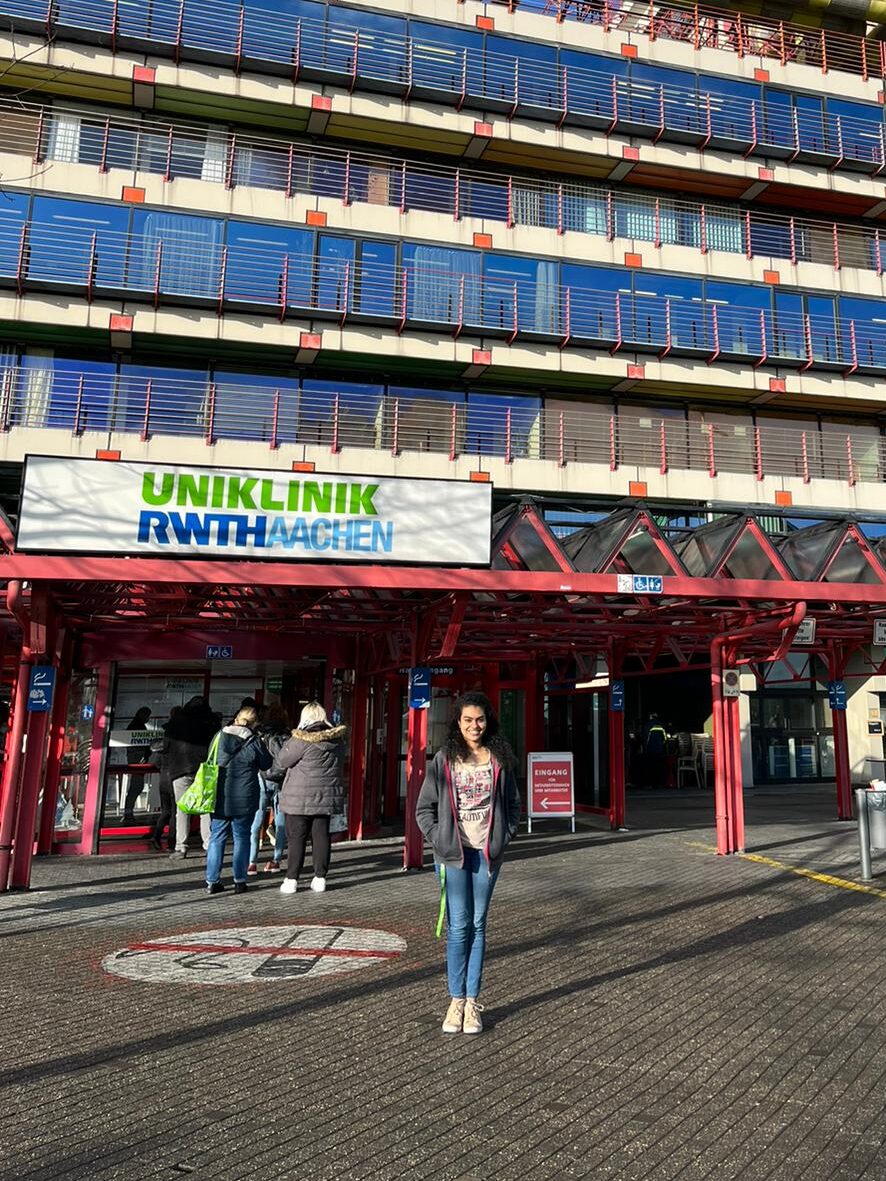Do you think becoming a doctor is the only way to pursue your interest in Biology? Well, Sraddha S. Bharadwaj’s career journey can debunk this myth for you. When Sraddha didn’t clear the medical entrance exams, she thought it would end her pursuit of Biology. However, upon research, she discovered some amazing, less-explored niches of Biology, which allowed her to dive deeper into her field of choice. Today, she holds a Bachelor’s degree in Biomedical Sciences – Human Genetics from Sri Ramachandra Institute of Higher Education and Research (SRIHER) and a Master’s degree in Integrated Immunology from the University of Oxford. She is currently a Doctoral Researcher at Uniklinik RWTH Aachen. We sat down with her to talk about her love for biomedical sciences and immunology, how she got into research, and her guide to higher studies in Europe.
How did your interest develop in Biomedical Sciences?
My interest in Biology developed in school, especially human biology, because I was fascinated by the complexities of the human body and the many processes that are happening in our body without our knowledge. Up until the end of high school, I was set on pursuing medicine. Medicine seemed to be a suitable option because it is a prestigious degree and I did well in school. My parents and I weren’t aware of any other course based on Biology. But I couldn’t crack the medical entrance exams on the first attempt and didn’t want to spend more time preparing for it. The course of my life changed when I discovered a Bachelor’s degree in Biomedical Sciences at an education fair. I didn’t even know a course like this existed. After some research, I found a similar degree that was offered in India and decided to pursue it.
When did you decide to get into research in the field of Immunology?
I didn’t know where my Bachelor’s degree would take me career-wise. My mother told me that research pays poorly and so, I avoided it. However, my perspective changed when I volunteered for a friend’s fellowship project. She was studying the toxic effects of artificial sweeteners on the development of common fruit flies, also known as Drosophila melanogaster. Despite being small-scale, participating in the project was so incredible that I applied to the fellowship myself the following year. My project was based on wound pathogens and burn wounds, and how a compound isolated from grapes may help treat such infections. Thinking about the host-pathogen interactions is where I believe my interest in Immunology first developed.
How did you get into the prestigious University of Oxford for your Master’s program in Immunology?
The University of Oxford is a very academics-oriented university, unlike others. If you display a keen interest in your field of choice, you have a higher chance of getting selected. They’re less bothered about extracurriculars that are not relevant to your field of study. At the time, I wanted to work on vaccine development, because it integrates Public Health and Immunology. So, I reflected on my collective experiences, like the fellowship project and the volunteer work I did with the National Service Scheme, to show that I’m truly invested in the field. The central topics of my degree were fundamental and translational immunology which helped me further pick a niche for research within immunology. My Master’s thesis was on understanding the mechanisms behind Primary Sclerosing Cholangitis. I explored the communication between two organs, the gut and the liver, which was a very new concept for me at the time. This novelty of the topic was the best part of the project for me.
How did you get into your PhD program in Germany?
The PhD process in Europe is difficult yet flexible. I would say utilising my network was beneficial when looking for PhD programs there. I emailed professors about any available openings, contacted a few through mutual connections, and applied to job advertisements. This helped me secure a position at the Department of Molecular Medicine, Uniklinik RWTH Aachen after successful rounds of interviews. I now conduct my research on the gut-liver axis of colorectal cancer metastasis with Dr Ana Izcue and Prof. Oliver Pabst.

What challenges did you face in your journey?
Not clearing the medical entrance exams was a major hurdle for me because I felt that I had disappointed everyone by not becoming the first doctor in the family. I became depressed. Ironically, what helped me get past it was studying Biomedical Sciences. I’m very grateful that medicine didn’t work out for me because now when I think about it, I wouldn’t have enjoyed medicine as much as science. This is why I consider it important to embrace changes as you go along. Despite thinking I’ll never be a researcher, I ended up becoming one. Similarly, I initially wanted to work on vaccine development, but now I work in Mucosal and Cancer Immunology. The decision to make such changes are difficult, so it is important to truly trust your instincts after careful consideration.
In my process of self-realisation, I discovered a need to be inquisitive. It’s what pushed me into science. I’m happy to go wherever my mind takes me. Staying curious and exploring my desired field in its entirety helped me find many opportunities, including my amazing PhD offer
So interesting!